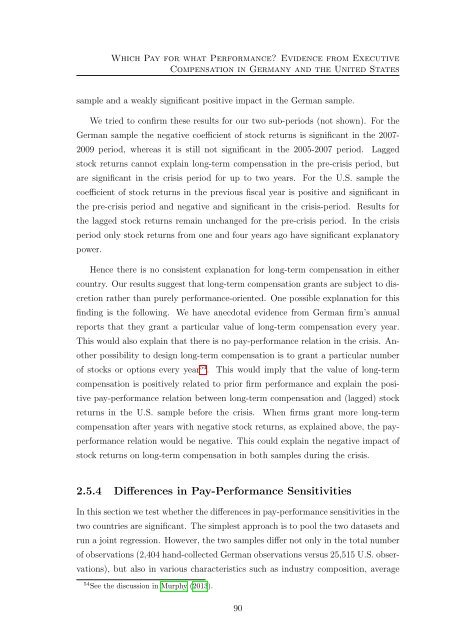Three Essays on Executive Compensation - KOPS - Universität ...
Three Essays on Executive Compensation - KOPS - Universität ...
Three Essays on Executive Compensation - KOPS - Universität ...
You also want an ePaper? Increase the reach of your titles
YUMPU automatically turns print PDFs into web optimized ePapers that Google loves.
Which Pay for what Performance? Evidence from <strong>Executive</strong><br />
Compensati<strong>on</strong> in Germany and the United States<br />
sample and a weakly significant positive impact in the German sample.<br />
We tried to c<strong>on</strong>firm these results for our two sub-periods (not shown). For the<br />
German sample the negative coefficient of stock returns is significant in the 2007-<br />
2009 period, whereas it is still not significant in the 2005-2007 period. Lagged<br />
stock returns cannot explain l<strong>on</strong>g-term compensati<strong>on</strong> in the pre-crisis period, but<br />
are significant in the crisis period for up to two years. For the U.S. sample the<br />
coefficient of stock returns in the previous fiscal year is positive and significant in<br />
the pre-crisis period and negative and significant in the crisis-period. Results for<br />
the lagged stock returns remain unchanged for the pre-crisis period. In the crisis<br />
period <strong>on</strong>ly stock returns from <strong>on</strong>e and four years ago have significant explanatory<br />
power.<br />
Hence there is no c<strong>on</strong>sistent explanati<strong>on</strong> for l<strong>on</strong>g-term compensati<strong>on</strong> in either<br />
country. Our results suggest that l<strong>on</strong>g-term compensati<strong>on</strong> grants are subject to discreti<strong>on</strong><br />
rather than purely performance-oriented. One possible explanati<strong>on</strong> for this<br />
finding is the following. We have anecdotal evidence from German firm’s annual<br />
reports that they grant a particular value of l<strong>on</strong>g-term compensati<strong>on</strong> every year.<br />
This would also explain that there is no pay-performance relati<strong>on</strong> in the crisis. Another<br />
possibility to design l<strong>on</strong>g-term compensati<strong>on</strong> is to grant a particular number<br />
of stocks or opti<strong>on</strong>s every year 54 . This would imply that the value of l<strong>on</strong>g-term<br />
compensati<strong>on</strong> is positively related to prior firm performance and explain the positive<br />
pay-performance relati<strong>on</strong> between l<strong>on</strong>g-term compensati<strong>on</strong> and (lagged) stock<br />
returns in the U.S. sample before the crisis. When firms grant more l<strong>on</strong>g-term<br />
compensati<strong>on</strong> after years with negative stock returns, as explained above, the payperformance<br />
relati<strong>on</strong> would be negative. This could explain the negative impact of<br />
stock returns <strong>on</strong> l<strong>on</strong>g-term compensati<strong>on</strong> in both samples during the crisis.<br />
2.5.4 Differences in Pay-Performance Sensitivities<br />
In this secti<strong>on</strong> we test whether the differences in pay-performance sensitivities in the<br />
two countries are significant. The simplest approach is to pool the two datasets and<br />
run a joint regressi<strong>on</strong>. However, the two samples differ not <strong>on</strong>ly in the total number<br />
of observati<strong>on</strong>s (2,404 hand-collected German observati<strong>on</strong>s versus 25,515 U.S. observati<strong>on</strong>s),<br />
but also in various characteristics such as industry compositi<strong>on</strong>, average<br />
54 See the discussi<strong>on</strong> in Murphy (2013).<br />
90
















